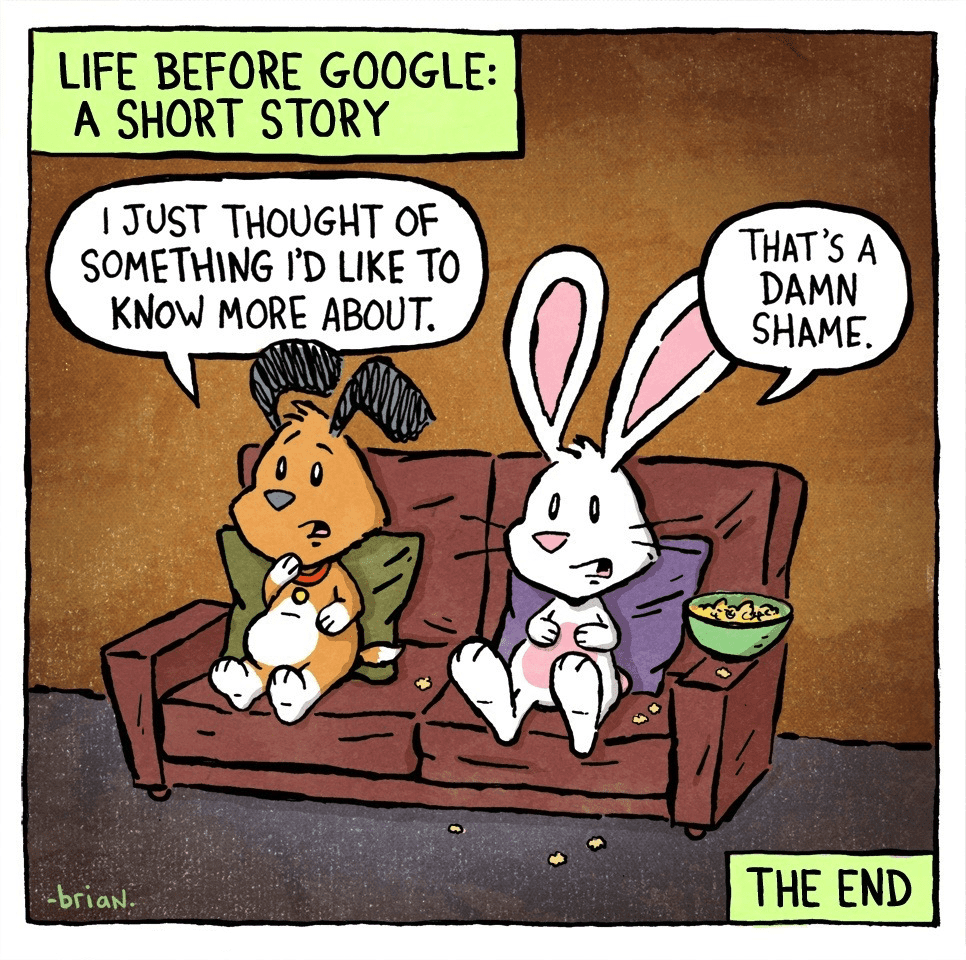In Google You Trust
People can be fairly quick to criticise Google.
It usually comes down to concerns about privacy, company culture, or monopolisation… but they continue to use the search engine – almost every day.
Not just that, but people trust the results.
It’s not only that it provides you with the most relevant results. People value the importance of instant gratification, personalisation, and control.
When it comes to developing trust in the online world, the paradigm has altered. Trust can now be established by meeting the human urge for faster gratification.
And Google does this exceptionally well.
Their algorithms are always changing, using machine learning to understand what others like to engage with and, as a result, providing you with the finest results possible.
This is accomplished through the use of a variety of metrics, the most recent of which are click-through rates and your website’s dwell times. The longer a person remains on a website after clicking through, the more relevant it is seen to be, and hence the higher it will rank.
As a result, the value of UX and a positive on-site experience cannot be overstated. But unless you want to talk about that right now, that’s a discussion for another day.
Trustworthiness
According to a previous study, an established newspaper is trustworthy since it is physical and has a well-known brand. The first Google result, on the other hand, is probably now regarded with the same level of legitimacy and trustworthiness as The Irish Times’ front page.
As a result, there has been a lot of debate regarding Google’s responsibility to serve not only the most relevant but also trustworthy websites in its rankings. This is why we now get things like this. Fake news has a lot to answer for.
With the change to a connected world, people want something digestible and easy to understand, such as a quick video, short article, or infographic – whatever it takes to scratch the itch. True or not, they’ll take it.
Information on human behaviour
Advertisers and psychologists now have access to a wealth of fresh behavioural data that they can use in personalised discussions and mass marketing campaigns.
Facebook, Apple, and Google, among other social media platforms and data collecting agencies, have been watching and sharing their users’ activity with specifics of data input, text messages, location, camera, actual personal information, and other capabilities in order to understand more about them.
Researchers have discovered patterns in human behaviour using this unprecedented data, shedding light on the human judgment process and trust-building.
Advertising and marketing is the most sophisticated and researched field when it comes to trust-building.
This isn’t surprising given that academics have access to trillions of data points voluntarily donated by people like you, and the discipline is growing beyond traditional understandings of human psychology and trust-building strategies.

Facebook, for example, analyses and tests people in a variety of emotional states in order to provide data about their decision-making.
Facebook has tailored each user’s experience based on their results and continues to learn about human behaviour.
A deep understanding
This comprehensive knowledge of each user is shared with the advertiser with the aim of establishing a successful and mutually beneficial partnership. And it’s incredibly effective. It absolutely works for us as an agency.
In order to educate and benefit their product and, in turn, marketers, Mailchimp, and other email marketing platforms deliver consumer data based on millions of emails every day as well as their customers’ behaviour.
Although it took some time, most people and businesses have come to regard the internet as an important part of their daily lives. This is also true with Google.
For quite some time, Google has been providing you with more relevant search results based on arguably personal information such as your location, previous purchases, search history, and interests, for example.
We’ve invested so much, and this wouldn’t be possible without trust. And this kind of trust is based on a fantastic, ever-evolving, and individualised product. All of this leads to instant gratification.
Mobile devices now give us instant results, or at the very least the capacity to search on demand.

New possibilities
This demand for rapid information fulfilment has made it easier to cancel plans and explore other opportunities. Questions are answered and arguments are resolved.
The ordering of search results is critical in online searching: users expect the best results to be displayed at the top of the page, and they trust search engines to locate the best results and rank them appropriately.
When a search engine returns a result, there are four parties involved:
- The search engine, obviously
- The source of information
- The SEO consultant or firm
- The user
All of these factors have an impact on a search engine’s ranking. While it is evident that a search engine has an impact on its own results, these other aspects must also be considered.
Filtering enormous amounts of results can be difficult for search engine users. As a result, users must have faith in the search engine’s ability to rank results based on their relevancy to the query.
In addition, it is important to consider whether consumers’ high levels of trust in search engines are justified, given the fact that no search engine has complete control over its results and that users have no other way of determining how good a search engine’s results are other than by looking at the results they find.
Positioning
People often believe Google’s positioning more than their own rational judgments, according to one eye-tracking study. It’s insane, yet true.
When you look at the data on privacy, you’ll see a contradiction…
- 65% of individuals do not want search engines to track their searches.
- 73% said they would be uneasy with a search engine keeping a tally of their requests and utilising that data to customise subsequent search results since they consider it is a privacy violation.
Despite all of this, Google still maintains a market share of 92.47% as of June 2021.
This is due to the fact that people place great value on search engines’ effectiveness. As a result, they continue to trust them and use them.
This performance is largely dependent on your private data. If it wasn’t, your search results would be much more general and certainly less relevant.
We freely submit our data to social media channels like Facebook, Instagram, LinkedIn, TikTok, and many others, but then believe we have the right to complain about confidentiality when these platforms provide us with a more personalised experience.
Your instant gratification comes at a price. It’s only a matter of deciding how much you’re willing to pay.


